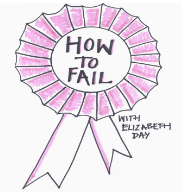11 Mar Lessons On failing for success
“Hello and welcome to How to Fail with Elizabeth Day, the podcast that celebrates the things that haven’t gone right. This is a podcast about learning from our mistakes and understanding that why we fail ultimately makes us stronger because learning how to fail in life actually means learning how to succeed better.”
The start of each podcast of How To Fail with Elizabeth Day takes the listener on a journey acknowledging failure exists for all of us at some point in our lives. As well as exploring the skills and emotional resilience formed from their experiences, we discover that what we personally term as a failure is all in our mindset.

Defining an experience as a Failure, or indeed as a Success, is all in our personal perception. We live in a time of curated perfection on social media, not just by the A-list movie stars and rock stars, but by our close friends and family. This curated narrative of success is how we want others to perceive us as successful and happy.
Our perceived failures are often dictated by expectations in society. Many of the interviewees highlight the expectations by our social conditioning from family, colleagues and friends as the next step on the life ladder. Society pulls us in certain directions, to conform, to be a person we are not.
Our perception of ourselves reflects in how others perceive us. After walking away from a plateaued career at The Observer, Day became aware of the rise in her self-worth was then matched by the way others perceived her – as she believed in herself, others did as well so establishing her emotional resilience, and she learned “making brave decisions gets easier the more you flex the muscle of emotional resilience.“
These points can be drawn together as success and failure are both determined by how we define the experience, often according to our social conditioning. We are back to the repeated thoughts forming and strengthening our dendrites as have learned on our Advance Performance courses. The more we hear or read about the next step in life as success, the more important it becomes in our own heads – and the bigger our perceived failure if we don’t do the expected. We need to change our mindset to perceive our “failures” as positive learning experiences to move forward.
When we do not succeed in the way we want to, picking ourselves up and moving forward is the most important lesson for our emotional resilience. As the political activist Gina Miller said in her episode “Picking yourself up from failure becomes a habit, being brave becomes a habit, speaking out becomes a habit and it just becomes part of your personality so it’s easier the more you do it.” A number of the interviewees explain how it takes determination and resilience to move away from the expectations of social conditioning to be their own voice, and map their own future.

The actor and How To Fail interviewee Simon Pegg explains the importance of taking responsibility for our mindset and how we perceive our own experiences: “Whether someone else determines your work as successful or unsuccessful is ultimately simply an opinion generated by that person’s own experiences, expertise and set of assumptions. Living your life according to what everyone else might think of you is to cede control of who you are. It is to outsource your identity to a bunch of strangers who do not know you.”
Whatever challenges we are faced with, we should always act by our own values and according to our integrity. This appears to be the main lesson taken away by many of the interviewees. As Gina Miller says “You have to look in the mirror and say I am who I am and not living my life by somebody else’s rules.” Each one of us is the only person who can determine how we reflect on any experience, and how we form our thoughts, attitudes, beliefs and behaviour. We may not be able to control the external events, but we control how we react and how we will behave in the future in a more positive and fulfilling way.
You can listen to the How To Fail podcasts on Apple, Spotify or Podbean.
How to Fail: Everything I’ve Ever Learned From Things Going Wrong by Elizabeth Day is now available in paperback.
To find out more about Elizabeth Day’s work, check her website.

